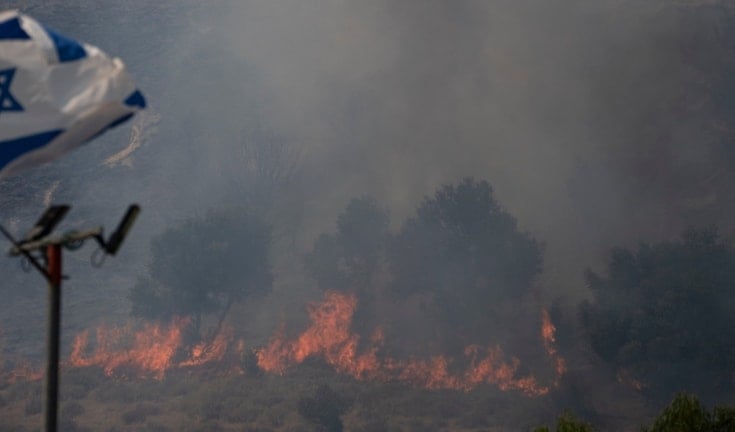'Israel' has six 'tough' choices facing Hezbollah, no guarantees
Former Deputy National Security Advisor Chuck Freilich outlines the significant risks and six strategic options 'Israel' must consider in its ongoing confrontation with Hezbollah.
-

'Israel' has six 'tough' choices facing Hezbollah, no guarantees
In a lengthy article in the Israeli newspaper Haaretz, former Deputy National Security Advisor Chuck Freilich discussed the significant risks "Israel" would face in the event of a wide-scale war with Lebanon, noting that it could lead to a multi-front war.
The former Israeli official stated that Hamas' ability to withstand the massive Israeli aggression, along with the deterioration of "Israel's" strategic position on a regional level, has boosted the confidence of the Axis of Resistance, likely increasing their willingness to take greater risks. He pointed out that the Axis believes it can withstand "Israel's" conventional superiority and even overcome it.
Freilich's warning came in the context of presenting the main options available to "Israel" in its ongoing confrontation with Hezbollah. He highlighted six options: continuing the current course, a unilateral ceasefire, coercive diplomacy, a diplomatic initiative, a limited operation, and a major operation.
Each option, he added, must be evaluated based on its likelihood of military and diplomatic success and its local ramifications. The most important question is whether this option is likely to lead to a tangible improvement in "Israel's" overall strategic position or if "we will pay a heavy price and eventually return to square one."
Six 'tough' options, no certain outcomes
The article delved into the details of the six "tough" options for "Israel" in any upcoming confrontation with Hezbollah:
Continuing the current course: Freilich stated that, so far, both "Israel" and Hezbollah have been careful to remain below the "threshold of escalation." He added that "the damage to cities, villages, and kibbutzim in northern 'Israel' is significant and worsening, with around 60,000 evacuees unable to return home for more than eight months."
It is worth noting that according to Israeli media, the number of evacuees exceeds 250,000 in northern "Israel."
Freilich further stressed that the "balance of terror" with Hezbollah, "following the 2006 war, has remained for a full 16 years. If a return to this type of policy is likely to lead to a long-term ceasefire, it should not be completely ruled out."
Unilateral ceasefire: He said this would be done in the hope of "isolating Hezbollah" and forcing it to cease fire while building international legitimacy for an Israeli military operation if necessary. However, he noted that an Israeli ceasefire would be seen as a sign of weakness and would be politically difficult to implement, especially during the Gaza war.
Coercive diplomacy: Following a unilateral ceasefire, "Israel" would issue a warning to Hezbollah demanding it stop its attacks within a certain timeframe, or "Israel" would strike. This option has the advantage of building international legitimacy, but the Biden administration would oppose it, especially with elections approaching. Hezbollah and the Axis of Resistance are likely to reject it, causing "Israel" to lose the element of surprise, and increasing the risk of a full-scale war.
Diplomatic initiative: According to Freilich, this is the best option, but the likelihood of reaching and maintaining an agreement over time is not high. He also mentioned that such an arrangement would require "Israel" to make "territorial concessions along the border."
Limited operation: The goal of this option would be to "restore Israeli deterrence," forcing Hezbollah to "accept a ceasefire and move away from the border so northern residents can return home."
However, Freilich noted that there is "no guarantee a limited operation will remain so or that Israel will achieve its military objectives. He emphasized that all rounds with Hezbollah since the 1990s, limited or otherwise, ended disappointingly for Israel, with the public weary of repeated promises of limited operations improving the situation."
Major operation: Freilich said the goal of this significant show of force would be to bring about a radical change in the situation. However, this option is fraught with great risks and could lead to a multi-front war. He emphasized that "Israel's home front, economy, and vital military capabilities would suffer severe blows." The war in Gaza would appear "pale" in comparison, with "Israel" yet to achieve its military goals there.
He noted that such a war would lead to growing anti-"Israel" sentiment in the United States and worldwide, potentially affecting the outcome of the close US presidential elections. Moreover, many would suspect that "Israel's" actions were driven by Netanyahu's need to continue hostilities to delay elections and his political demise, regardless of the objective reason. The ongoing internal Israeli political crisis would make managing the war particularly difficult.
Freilich concluded by highlighting "Israel's" failure to prevent Hezbollah's accumulation of capabilities. He added that the desire to deliver a strong blow now is entirely understandable, but "Israeli policy must be carefully calculated, reflecting a mix of these six options."
He stressed that "the postponed war may be the one that never materializes on the ground, which is the best kind." Consequently, Israeli settlers must live with the current reality, a "painful outcome", especially for northern settlers who "will have to choose between returning to their homes under constant threat or relocating elsewhere."
Read more: Iron Dome may not be effective against Hezbollah's arsenal: CNN

 5 Min Read
5 Min Read








